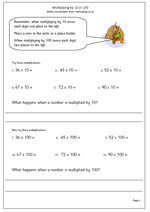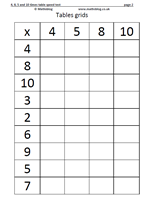 Understanding what happens when you multiply a whole number by 10 is crucial to understanding maths at primary school and indeed with later maths. Children should have carried out lots of practical work with base 10 apparatus in school to show that:
Understanding what happens when you multiply a whole number by 10 is crucial to understanding maths at primary school and indeed with later maths. Children should have carried out lots of practical work with base 10 apparatus in school to show that:
when you multiply a whole number by 10 the digits move one place to the left.
Now this may give the appearance of ‘adding a nought’ as a zero is placed in the units. I know of many teachers and publishers who still use this expression, but it is extremely dangerous, especially when it comes to multiplying decimals by 10. (0.8 is not 0.80).
Multiplying by 100 is the same as multiplying by 10 and then multiplying by 10 again (10 x 10 = 100) so each digit will move two places to the left and zeros will need to be placed in the units and tens.
When you multiply a whole number by 100 the digits move two places to the left.



 Well, Christmas is nearly upon us so I am going to have a few days break and just leave you with a tricky little Christmas maths puzzle. I will be back with loads more worksheets and maths ideas in the new year.
Well, Christmas is nearly upon us so I am going to have a few days break and just leave you with a tricky little Christmas maths puzzle. I will be back with loads more worksheets and maths ideas in the new year.
 An easier word search today, looking at words to do with place value.
An easier word search today, looking at words to do with place value.